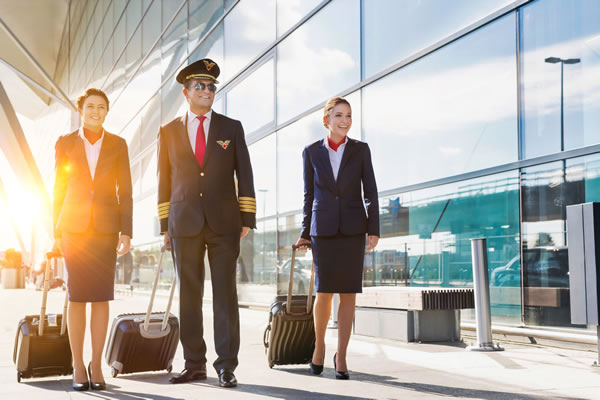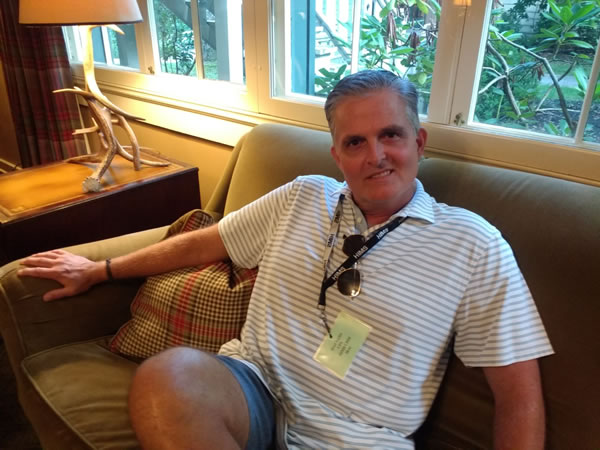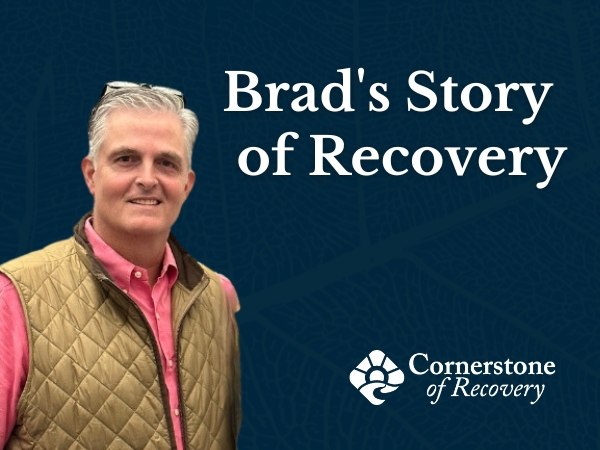The hardest phone call Brad Sayles ever had to make was the one that changed his life.
The East Tennessee native and UPS pilot, who also serves as the company’s chairman of the HIMS Program (Human Intervention and Motivation Study), couldn’t even utter “alcoholic,” at least regarding himself. But despite his success — in college, in the military, as a professional pilot — booze was the one thing that grounded him.
“I had an epiphany one night, but when I called the HIMS Program, two days later, I was in treatment at Cornerstone of Recovery,” Sayles said. “I was fortunate to have an airline that understood and a program designed for that, but then I had to somehow get over the idea that I was special or capable of overcoming something like addiction.”
“I had to give myself a break, and pretty quickly, I understood that everyone walking around has demons, and alcohol happened to be mine. I’ll never be able to resolve it completely, but as long as I keep my arms wrapped around it, it’s something I can manage.”
HIMS Program: A way to give back
One of the ways he manages it is through service. A core component of 12-step recovery work, Sayles has incorporated it into his job, and now he’s in a position to help others with UPS who struggle with drugs or alcohol get clean and sober. He also joins representatives of several carriers for the Peer Pilot and Management Conference, an annual event hosted by Cornerstone of Recovery.
Sayles and his peers came together to network, share information, and further their joint mission: to help those in the aviation industry who suffer as Sayles once did find a way to salvage their careers and change their lives.
“You get speakers and the FAA (Federal Aviation Administration) perspective. Before I went to treatment, I was scared to death of the FAA. I thought it was out to ‘get’ me, but nothing could be further from the truth. They get it because they understand addiction and recovery and that addiction and alcoholism are medical situations. We can have those conversations, and then all of your side conversations between sessions and during meals make it a valuable resource.”
What is the HIMS Program?
 Developed in 1974, the HIMS Program was designed to give pilots affected by alcoholism and addiction the process of receiving treatment and returning to the cockpit under the FAA’s Special Issuance Regulations (14 CFR 67.401). Before its implementation, the fear of job loss prevented many pilots from asking for help out of fear of losing their jobs. Still, today, most of those who receive treatment have successfully returned to duty. HIMS is a comprehensive process that involves company representatives, peer pilot volunteers, health care professionals, and FAA medical specialists. While it includes treatment methods for all addicted individuals, it utilizes steps unique to the safety-sensitive airline industry.
Developed in 1974, the HIMS Program was designed to give pilots affected by alcoholism and addiction the process of receiving treatment and returning to the cockpit under the FAA’s Special Issuance Regulations (14 CFR 67.401). Before its implementation, the fear of job loss prevented many pilots from asking for help out of fear of losing their jobs. Still, today, most of those who receive treatment have successfully returned to duty. HIMS is a comprehensive process that involves company representatives, peer pilot volunteers, health care professionals, and FAA medical specialists. While it includes treatment methods for all addicted individuals, it utilizes steps unique to the safety-sensitive airline industry.
For those who face a problem like alcoholism, however, saving a career is important, but it’s also secondary. Restoring a life is priority No. 1.
“I started drinking heavily from the first time I started drinking at 16. That first time, it was like, ‘That was fun — let’s do that again!'” he said. “In college, things got a little muddy because everybody’s drinking then, and then when I transitioned into the military, I found another group of people that like to drink like I did.
“But then I got on with UPS, got married, raised kids, and my drinking just slowly got worse, like we know it does if you’re headed down that path. I was probably in my 40s when I knew it wasn’t sustainable and that something had to change to see 60. I was starting to have some health consequences and was scared.”
Still, admitting to alcoholism was even more frightening. Through the Aviation Program at Cornerstone of Recovery, he began to understand that rather than wearing the label as a scarlet letter, he could use it to help others. After several months, he returned to UPS, and the HIMS Program lanyard he wore was a dead giveaway of where he’d been and what he’d been dealing with.
“I just kind of owned it that way,” he said. “It took about a week for people to figure it out, and most were proud. Over time, I knew what the HIMS committee did for me, and while it’s mostly a monitoring program — 12 Step self-help groups are what help you keep your recovery; HIMS is making sure you don’t mess up — I knew that for it to be successful, it needed somebody running it who was in recovery.”
Keeping what he has by giving it away
 That somebody became Sayles, who, like many of his peers at this week’s conference, approaches those in similar situations as a recovering alcoholic first and a HIMS representative second.
That somebody became Sayles, who, like many of his peers at this week’s conference, approaches those in similar situations as a recovering alcoholic first and a HIMS representative second.
“Speaking as someone who’s been through that, I think it’s beneficial in talking to guys who are, a lot of them, Type A personalities, like I was, who feel like they should somehow be above the problem,” he said. “We have to understand that there is a problem, that we need to look at it, and that we’re not that special. And 95% of them are grateful and willing.”
Many wear their recovery as a badge of honor rather than a mark of shame. The rate of aviation professionals in recovery has grown exponentially in recent years, as more individuals from all positions in the industry have come to a better understanding of the disease concept of addiction and the value of getting help for it.
Sayles added directing people to Cornerstone of Recovery is what he feels is the best course of action. He’s admittedly biased since the facility helped him get his life back and into a position where he can incorporate Step 12 into his career. But the numbers back up his beliefs about the facility.
“There are a handful of treatment centers that you can put on par with Cornerstone, and I’ve had a chance to talk to many of them,” he said. “But hands down, from a programming and counseling standpoint, Cornerstone is head and shoulders above everybody.
“The fact that it’s largely run by people who understand and have been through it is important to me. I’ve been to several of these conferences and talked to dozens of these treatment centers, and many of them have something to offer. But from an aviation standpoint, the hoops and hurdles you must jump through to get back flying, Cornerstone is so familiar with that — but it’s also a byproduct of good recovery. They want to get these guys back to work, but get them healthy first.”


